

Deterioro cognitivo postoperatorio y nuestro papel en anestesia. I/II - AnestesiaR. En el proceso del envejecimiento, la mayoría de los sistemas orgánicos mantienen su funcionalismo basal, pero existe una reducción de la reserva funcional y de la capacidad para compensar el estrés fisiológico.
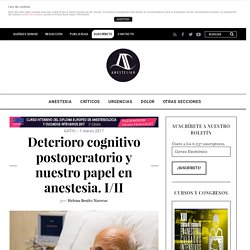
Es por ello, que existe un aumento de las complicaciones postoperatorias en el anciano. Probablemente , una de las más habituales es la aparición de Disfunción Cognitiva Postoperatoria. Benito Naverac H. FEA de Anestesiología y Reanimación. Hospital Clínico Universitario Lozano Blesa de Zaragoza. En el prólogo al primer tomo de las Obras completas, Delibes dice que como escritor «murió en Madrid el 21 de mayo de 1998, en la mesa de operaciones de la clínica La Luz (…)En el quirófano entró un hombre inteligente y salió un lerdo.
Con estas palabras expresaba Miguel Delibes una complicación postoperatoria vox populi. Introducción Definiciones Los trastorno cognitivos postoperatorios se clasifican fundamentalmente en : • Disfunción cognitiva perioperatoria • Delirium • Demencia. Deterioro cognitivo postoperatorio y nuestro papel en anestesia. II/II - AnestesiaR. No existe un tratamiento farmacológico específico para los pacientes que sufren un DCPO.
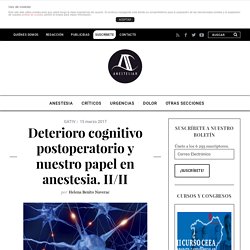
Los aspectos preventivos adquieren una importancia relevante. La prevención y tratamiento del delirium requiere de un enfoque multidisciplinario, en el que se incluyan tanto medidas farmacológicas como no farmacológicas. Benito Naverac H. FEA de Anestesiología y Reanimación. Hospital Clínico Universitario Lozano Blesa de Zaragoza. Neurotoxicidad Generalmente creemos que la anestesia general es un proceso totalmente reversible pero, la realidad podría ser bien distinta. Fármacos con acción anticolinérgica El cerebro responde a diferentes mecanismos de lesión cerebral primaria y secundaria con una respuesta inflamatoria y liberación de distintos mediadores como el TNF-α, la interleucina 1-β interferón-δ, lo que puede influir en la aparición de un desequilibrio en la síntesis, liberación e inactivación de ciertos neurotransmisores que modulan la función cognitiva.
Benzodiacepinas Anestesia general Prevención. Nihms127862. Postoperative Cognitive Dysfunction (21.02.2014) Background: Older patients in particular are vulnerable to memory disturbances and other types of cognitive impairment after surgical operations.
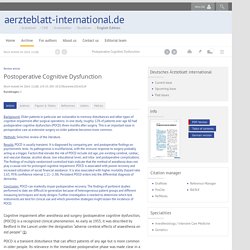
In one study, roughly 12% of patients over age 60 had postoperative cognitive dysfunction (POCD) three months after surgery. This is an important issue in perioperative care as extensive surgery on older patients becomes more common. Methods: Selective review of the literature. Results: POCD is usually transient. It is diagnosed by comparing pre- and postoperative findings on psychometric tests. Conclusion: POCD can markedly impair postoperative recovery. Cognitive impairment after anesthesia and surgery (postoperative cognitive dysfunction, [POCD]) is a recognized clinical phenomenon. POCD is a transient disturbance that can affect patients of any age but is more common in older people. The aging of the population and new developments in medicine both imply that the number of older patients undergoing extensive surgery will keep rising.
Biomarkers of postoperative delirium and cognitive dysfunction. Introduction More than 40% of surgical procedures in the US are performed on patients aged 65 and over Control Prevention Centers for Disease (2010).
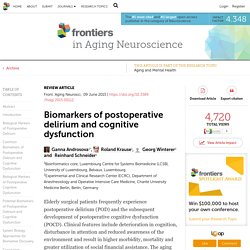
Elderly patients frequently experience postoperative cognitive impairment, characterized by progressive cognitive and sensory decline. An acute phase of cognitive impairment is postoperative delirium (POD; according to DSM-5: 293.0 “Delirium Due to Another Medical Condition”; Rudolph et al., 2008a). Deliria are further classified by duration and level of activity such as hyperactive, hypoactive or mixed. Patients with POD frequently develop a chronic phase of cognitive impairment, i.e., postoperative cognitive dysfunction (POCD; according to DSM-5: 294.10/11 “Major Neurocognitive Disorder Due to Another Medical Condition Without/With Behavioral Disturbance” or 331.83 “Mild Neurocognitive Disorder Due to Another Medical Condition”; Rudolph et al., 2008a). Journal of Perioperative Science. Introduction There are an estimated 234 millions surgeries performed each year worldwide [1].
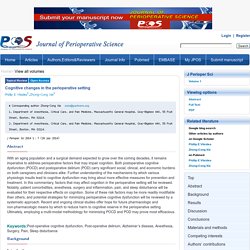
In the United States, annual inpatient surgical volume has increased from approximately 23.8 million surgeries in 1998 to over 30 million in 2010 [2,3]. Ambulatory surgical center visits have also increased by an estimated 300 percent between the years 1996 and 2006 [4]. Concomitant with this increased surgical volume is the increasingly aging population in the United States. While those age 65 and older represented about 13% of the population in 2010, this number is expected to climb to 19% (an additional 31.9 million people) by 2030 [5].
Based on the above estimates, it is imperative that elements affecting cognition in the perioperative setting be analyzed. Review As mentioned above, we will review five elements of the perioperative setting – patient comorbidities, anesthesia, surgery and inflammation, perioperative pain, and sleep disturbance, which may modify the risk of POCD and POD. Aeu350. 0000542 200002000 00043. 0000542 201105000 00036. [Effect of propofol and isoflurane on surgical stress response and postoperative cognitive... - Abstract - Europe PMC. Postoperative cognitive dysfunction after inhalational anesthesia in elderly patients undergoing major surgery: the influence of anesthetic technique, cerebral injury and systemic inflammation. 1247.